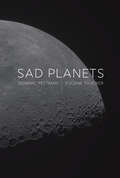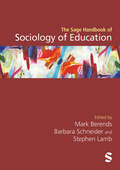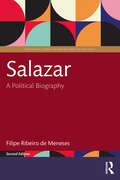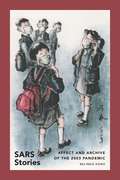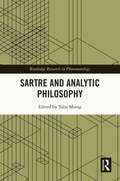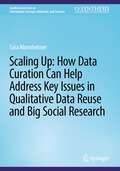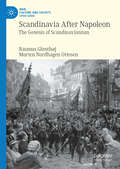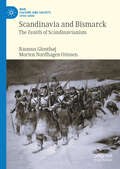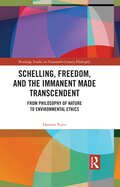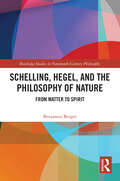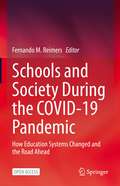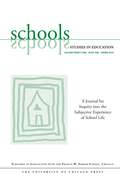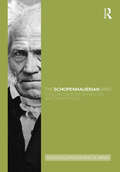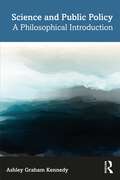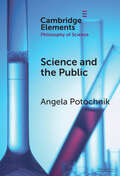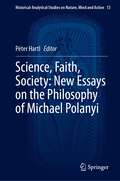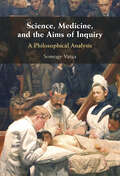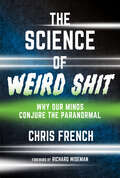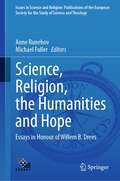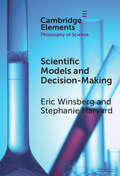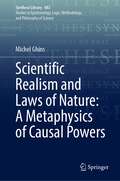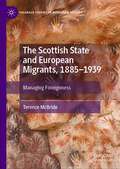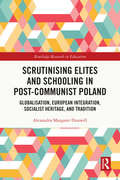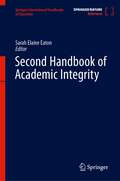- Table View
- List View
Sad Planets
by Dominic Pettman Eugene Thacker“Everything is sad,” wrote the Ancient poets. But is this sadness merely a human experience, projected onto the world, or is there a gloom attributable to the world itself? Could the universe be forever weeping the “tears of things”? In this series of meditations, Dominic Pettman and Eugene Thacker explore some of the key “negative affects” – both eternal and emergent – associated with climate change, environmental destruction, and cosmic solitude. In so doing they unearth something so obvious that it has gone largely unnoticed: the question of how we should feel about climate change. Between the information gathered by planetary sensors and the simple act of breathing the air, new unsettling moods are produced for which we currently lack an adequate language. Should we feel grief over the loss of our planet? Or is the strange feeling of witnessing mass extinction an indicator that the planet was never “ours” to begin with? Sad Planets explores this relationship between our all-too-human melancholia and a more impersonal sorrow, nestled in the heart of the cosmic elements.Spanning a wide range of topics – from the history of cosmology to the “existential threat” of climate change – this book is a reckoning with the limits of human existence and comprehension. As Pettman and Thacker observe, never before have we known so much about the planet and the cosmos, and yet never before have we felt so estranged from that same planet, to say nothing of the stars beyond.
The Sage Handbook of Sociology of Education
by Mark Berends Barbara Schneider Stephen LambThe Sage Handbook of Sociology of Education is an international and comprehensive groundbreaking text that serves as a touchstone for researchers and scholars interested in exploring the intricate relationships between education and society. Leading sociologists from five different continents examine major topics in sociology from a global perspective. This timely, thought-provoking Handbook features contributions from leading and emerging sociology scholars, who provide their own cultural and historical perspectives on diverse—yet universal—topics; these include educational policy, social stratification, and cross-national research. 39 Chapters delve into the pressing issues faced by our global society, such as the effects of residential mobility on educational outcomes, gender and ethnic inequalities, and the impact of COVID-19 on early childhood education. Readers will gain a multifaceted view of the contours of educational inequality, from various international perspectives and focusing on country differences, as well as recommendations for expanding the practices, programs, and policies that could reduce the rising tide of inequities—especially for populations most at risk. This Handbook offers rich, diverse perspectives on the interplay between education, social inequality, and human rights around the world, making it an invaluable resource for students, researchers, and practitioners across a range of fields, including sociology, education, and social policy. PART 1: Education and Persistent Inequality PART 2: Social & Family Contexts PART 3: Schools & Educational Policy PART 4: Neighborhoods & Community PART 5: Education & Innovation in a Global Context
The Sage Handbook of Sociology of Education
by Mark Berends Barbara Schneider Stephen LambThe Sage Handbook of Sociology of Education is an international and comprehensive groundbreaking text that serves as a touchstone for researchers and scholars interested in exploring the intricate relationships between education and society. Leading sociologists from five different continents examine major topics in sociology from a global perspective. This timely, thought-provoking Handbook features contributions from leading and emerging sociology scholars, who provide their own cultural and historical perspectives on diverse—yet universal—topics; these include educational policy, social stratification, and cross-national research. 39 Chapters delve into the pressing issues faced by our global society, such as the effects of residential mobility on educational outcomes, gender and ethnic inequalities, and the impact of COVID-19 on early childhood education. Readers will gain a multifaceted view of the contours of educational inequality, from various international perspectives and focusing on country differences, as well as recommendations for expanding the practices, programs, and policies that could reduce the rising tide of inequities—especially for populations most at risk. This Handbook offers rich, diverse perspectives on the interplay between education, social inequality, and human rights around the world, making it an invaluable resource for students, researchers, and practitioners across a range of fields, including sociology, education, and social policy. PART 1: Education and Persistent Inequality PART 2: Social & Family Contexts PART 3: Schools & Educational Policy PART 4: Neighborhoods & Community PART 5: Education & Innovation in a Global Context
Salazar: A Political Biography (Routledge Studies in Fascism and the Far Right)
by Filipe Ribeiro de MenesesSalazar: A Political Biography is the definitive biography of the longstanding Portuguese dictator. António de Oliveira Salazar entered the government of Portugal when Herbert Hoover was president and ended his political career at the end of the Johnson administration. He remained in power for forty years (1928–1968), one of the longest tenures in modern history. Unlike the other ‘great dictators’ of the twentieth century, Salazar, an academic, immersed himself in the minutiae of government and administration, maintaining a prodigious work rate until illness forced his retirement. He successfully managed his country’s finances despite the impact of the Great Depression, imposing a harsh policy of austerity. He then preserved Portugal’s neutrality during the Second World War, ultimately favouring Great Britain and the United States. But Salazar was at heart an extremely conservative, even reactionary statesman. He relied on secrecy and a police state to maintain the order which, he believed, was necessary to control progress. Rejecting the anti-colonialist movements in Asia and Africa, he plunged Portugal into a series of wars in Africa it could ill afford. Fully revised and updated throughout, this remains the authoritative biography of a key Portuguese political leader who was a significant presence in twentieth-century politics. This book will be of interest to historians of the far right, international diplomacy and Portugal.
SARS Stories: Affect and Archive of the 2003 Pandemic (Sinotheory)
by Belinda KongIn SARS Stories, Belinda Kong delves into the cultural archive of the 2003 SARS pandemic, examining Chinese-language creative works and social practices at the epicenters of the outbreak in China and Hong Kong. As the COVID-19 pandemic has highlighted issues of anti-Asian racism and sinophobia, Kong traces how Chinese people navigated the SARS pandemic and created meaning amid crisis through cultures of epidemic expression. From sentimental romances and Cantopop songs to raunchy sex comedies and crowdsourced ghost tales, unexpected and minor genres and creators of Chinese popular culture highlight the resilience and humanity of those living through the pandemic. Rather than narrating pandemic life in terms of crisis and catastrophe, Kong argues that these works highlight Chinese practices of community, care, and love amid disease. She also highlights the persistence of orientalism in anglophone accounts of SARS index patients and global reporting on COVID-era China. Kong shows how the Chinese experiences of living with SARS can reshape global feelings toward pandemic social life and foster greater fellowship in the face of pandemics.
Sartre and Analytic Philosophy (Routledge Research in Phenomenology)
by Talia MoragThis book explores the relevance of Sartre’s work for various areas in contemporary philosophy, including the imagination, philosophy of language, skepticism, social ontology, logic, film, practical rationality, emotions, and psychoanalysis. Unlike other collections focused on Sartre, this book is not intended as a book of Sartre scholarship or interpretation. The volume’s contributors, trained in analytic philosophy, engage with Sartre’s work in new refreshing ways, which does not require seeing him as primarily belonging to the continental philosophical traditions of phenomenology or existentialism. Instead, this book aims to make available and fruitfully explore the unheralded insights of Sartre, to creatively re-appropriate or rationally reconstruct certain fruitful ideas or approaches of Sartre and confront them with or make them available to contemporary philosophy in general. Sartre thereby emerges from this book as a versatile philosopher with a stake in a large variety of philosophical concerns. Sartre and Analytic Philosophy will appeal to Sartre scholars who are interested in his relevance to contemporary philosophical debates, as well as philosophers who are interested in exploring new ways of doing philosophy, which are neither stereotypically “analytic” nor “continental.”
Scaling Up: How Data Curation Can Help Address Key Issues in Qualitative Data Reuse and Big Social Research (Synthesis Lectures on Information Concepts, Retrieval, and Services)
by Sara MannheimerThis book explores the connections between qualitative data reuse, big social research, and data curation. A review of existing literature identifies the key issues of context, data quality and trustworthiness, data comparability, informed consent, privacy and confidentiality, and intellectual property and data ownership. Through interviews of qualitative researchers, big social researchers, and data curators, the author further examines each key issue and produces new insights about how domain differences affect each community of practice’s viewpoints, different strategies that researchers and curators use to ensure responsible practice, and different perspectives on data curation. The book suggests that encouraging connections between qualitative researchers, big social researchers, and data curators can support responsible scaling up of social research, thus enhancing discoveries in social and behavioral science.
Scandinavia After Napoleon: The Genesis of Scandinavianism (War, Culture and Society, 1750–1850)
by Rasmus Glenthøj Morten Nordhagen OttosenThis book explores the intellectual grounds of Scandinavianist ideology and its political development into a national unification movement. Denmark, Norway and Sweden were nearly annihilated during the Napoleonic Wars. The lesson learned was that survival was a matter of size. Whereas their union of 1814 offered Sweden-Norway geostrategic security tempered by fear of Russia, Denmark was the biggest territorial loser of the Napoleonic Wars and faced separatism connected to German nationalism in the duchies of Schleswig and Holstein. This evolved into a national conflict that threatened Denmark’s survival as a nation. Meanwhile, a new generation of Danes, Swedes and Norwegians had come to regard kindred language, culture and religion as a case for Scandinavian union that could offer protection against Russia and Germany. When the European revolutions of 1848 unleashed the First Schleswig War, the influence of Scandinavianism was such that it nearly turned into a Scandinavian war of unification.
Scandinavia and Bismarck: The Zenith of Scandinavianism (War, Culture and Society, 1750–1850)
by Rasmus Glenthøj Morten Nordhagen OttosenThis book accounts for Scandinavian unification efforts in a time of great upheaval. The ideological repercussions of the European revolutions of 1848-1849 and the Crimean War (1853-1856) transformed both the international political system and nationalism into more ‘realist’ types. The First Schleswig War (1848-1851) having nearly turned into one of Scandinavian unification, the influence of Scandinavianism extended into the Danish, Swedish and Norwegian courts, cabinets and parliaments, attracting interest from the great powers. The Crimean War offered another window of opportunity for Scandinavian unification, before the Danish-German conflict over the duchies of Schleswig and Holstein nearly united Scandinavia upon the outbreak of the Second Schleswig War in 1864. The ultimate failure of Scandinavianism in its unification efforts was not predetermined, although historiography has made it appear as such. Napoleon III, Cavour and Bismarck all actively contributed to plans for Scandinavian unification, the latter even declaring himself as “very strongly Scandinavian”.
Schelling, Freedom, and the Immanent Made Transcendent: From Philosophy of Nature to Environmental Ethics (Routledge Studies in Nineteenth-Century Philosophy)
by Daniele FulviThis book offers a cutting-edge interpretation of the philosophy of F.W.J. Schelling by critically reconsidering the interpretations of some of his “successors.” It argues that Schelling’s philosophy should be read as an ontology of immanence, highlighting its relevance for ongoing debates on ethics and freedom. The book builds on a key notion from Schelling’s Philosophy of Revelation where he outlines the process through which transcendence must return to immanence in order to be grasped and understood. The author identifies Jaspers, Heidegger, and Deleuze as the main interpreters of Schelling’s philosophical activity, highlighting their relevance for subsequent Schelling scholarship. Heidegger and Jaspers refer to Schelling’s philosophy in negative terms, namely as an incomplete and unviable philosophical system, whereas Deleuze holds the immanent core of Schelling’s ontological discourse in high regard. The author’s analysis demonstrates that reading Schelling’s philosophy as an ontology of immanence not only avoids Heidegger’s and Jaspers’s criticisms but is also more fitting to Schelling’s original meaning. Accordingly, his reading allows us to fully grasp Schelling’s thought in all its strength and consistency: as a philosophy that avoids metaphysical abstractions and maintains the concreteness of concepts like God, nature, freedom by binding them to a solid and material account of Being. Finally, the author uses Schelling to propose an innovative reading of freedom as a matter of resistance, and of philosophy as an activity whose main purpose is that of seeking the actual extent and place of (human) life and freedom within nature. The author originally emphasises the relevance of these conclusions on contemporary debates in Postcolonial Critical Theory and Environmental Ethics. Schelling, Freedom, and the Immanent Made Transcendent. From Philosophy of Nature to Environmental Ethics will appeal to scholars and advanced students working in 19th-century Continental philosophy, German idealism, and Postcolonial Critical Theory and Environmental Ethics.
Schelling, Hegel, and the Philosophy of Nature: From Matter to Spirit (Routledge Studies in Nineteenth-Century Philosophy)
by Benjamin BergerThis book develops an original interpretation of the relationship between F.W.J. Schelling and G.W.F. Hegel. It argues that the difference between these philosophers should be understood in light of their shared commitment to the philosophy of nature and the idea that spirit, or humanity, emerges from the natural world. The author makes a case for the contemporary relevance of German idealist philosophy of nature by walking the reader through its major themes, motivations, and arguments. Along the way, Schelling and Hegel are shown to develop key insights about the structure of reality and the dependence of living things and human beings upon inorganic natural processes. In elucidating the details of Schelling’s and Hegel’s respective philosophies of nature, the book challenges some of our most basic assumptions about the scope of philosophical inquiry and the relationship between matter, life, and human existence. Schelling, Hegel, and the Philosophy of Nature will appeal to scholars and advanced students working on German idealism, as well as those interested in contemporary philosophies of nature and the topic of emergence.
Schools and Society During the COVID-19 Pandemic: How Education Systems Changed and the Road Ahead
by Fernando M. ReimersThis open access book provides an analysis of the effects of the COVID-19 Pandemic on diverse education systems, and of the results of the policies adopted to sustain educational opportunities. Through a series of diverse national case studies, the book examines the preexisting fragilities and vulnerabilities in educational structures which shaped the nature of the varied responses, around the world, to teaching and learning during the worst crisis in public education in recent history.The chapters in the book take stock of how educational opportunities changed in various education systems around the world as a result of the Covid-19 pandemic, answering the question of what did education systems, and societies, learn about education as a result of the pandemic.The book covers diverse education systems, with varying levels of resources and facing distinct education challenges, including Brazil, Chile, Finland, Japan, Mexico, Norway, Portugal, Russia, Singapore, Spain, South Africa, and the United States.
Schools, volume 21 number 1 (Spring 2024)
by SchoolsThis is volume 21 issue 1 of Schools. Schools: Studies in Education provides a forum for classroom educators to describe and meditate on the complex experiences of school life. The journal publishes scholarly articles, reflective essays, and stories that convey how human relationships, thoughts, and emotions shape the meaning of what happens when learning actually occurs. Historical documents in “From the Archives” feature intriguing excerpts from works that provide insight into contemporary issues. Opinion pieces in “On the Horizon” feature arguments about the future of education planning and policy. Reviews critically evaluate books, films, art exhibitions, concerts, and other events that have some bearing on the meaning and value of education.
The Schopenhauerian Mind (Routledge Philosophical Minds)
by David Bather Woods and Timothy StollArthur Schopenhauer (1788-1860) is now recognised as a figure of canonical importance to the history of philosophy. Schopenhauer founded his system on a highly original interpretation of Kant’s philosophy, developing an entirely novel and controversial worldview guided centrally by his striking conception of the human will and of art and beauty. His influence extends to figures as diverse as Fredrich Nietzsche, Ludwig Wittgenstein and Iris Murdoch within philosophy, and Richard Wagner, Thomas Hardy, Sigmund Freud, Thomas Mann, Samuel Beckett and Jorge Luis Borges outside it. The Schopenhauerian Mind is an outstanding, wide-ranging collection that explores the rich nature of Schopenhauer's ideas, texts, influences, and legacy. Comprising 38 original chapters by an international team of contributors, the volume is organised into five clear parts: Knowledge and Reality Aesthetics and the Arts Ethics, Politics, and Salvation Before Schopenhauer After Schopenhauer The Schopenhauerian Mind covers all the key areas and concepts of Schopenhauer’s philosophy, including fields omitted in previous studies. It is essential reading for students of nineteenth-century philosophy, Continental philosophy and philosophy of art and aesthetics, and also of interest to those in related disciplines such as literature and religion.
Science and Public Policy: A Philosophical Introduction
by Ashley Graham KennedyScience and Public Policy: A Philosophical Introduction argues that in order to effectively apply science in any relevant or meaningful way, we must first understand what science is, how it works, and what its limitations are. The first half of the book thus discusses the domain of science, the concept of scientific evidence, and the interpretation of scientific data. The second half then moves through a detailed discussion of science communication in the public sphere, the concept, use and limitations of scientific expertise, and finally, the ways in which we can effectively apply science to public policies in the context of a democratic society. Along the way, the book uses detailed scientific examples to explore the relationship between science and uncertainty with the aim of showing that, in the end, public debates over science are rarely over the science itself, but instead over what public policies will follow from the science. Key Features Explains what science is, as well as what it can and cannot do in the context of public policyOffers separate chapters dedicated to - Scientific Methodology - Scientific Evidence - Interpreting the Science - Communicating the Science - Scientific Expertise - Science-Informed Public Policies Includes Introductions and Summaries in each chapter to help guide the reader throughout the book
Science and the Public (Elements in the Philosophy of Science)
by null Angela PotochnikScience is a product of society: in its funding, its participation, and its application. This Element explores the relationship between science and the public with resources from philosophy of science. Chapter 1 defines the questions about science's relationship to the public and outlines science's obligation to the public. Chapter 2 considers the Vienna Circle as a case study in how science, philosophy, and the public can relate very differently than they do at present. Chapter 3 examines how public understanding of science can have a variety of different goals and introduces philosophical discussions of scientific understanding as a resource. Chapter 4 addresses public trust in science, including responding to science denial. Chapter 5 considers how expanded participation in science can contribute to public trust of science. Finally, Chapter 6 casts light on how science might discharge its obligations to the public.
Science, Faith, Society: New Essays on the Philosophy of Michael Polanyi (Historical-Analytical Studies on Nature, Mind and Action #13)
by Péter HartlThe book is arguably the first comprehensive collection of essays on Michael Polanyi’s social, political philosophy. The essays combine philosophical and historical approaches to show Polanyi’s social thought in the context of his epistemology and philosophy of science as well as the 20th century intellectual history. This volume appeals to specialists in Michael Polanyi’s philosophy, political philosophers who are interested in the 20th century political thought, mainly conservative-liberal political tradition. Furthermore it appeals to scholars focusing on the intersections between epistemology and political philosophy.
Science, Medicine, and the Aims of Inquiry: A Philosophical Analysis
by null Somogy VargaAfter its unparalleled rise and expansion over the past century, medicine is increasingly criticized both as a science and clinical practice for lacking scientific rigor, for contributing to overmedicalization, and for failing to offer patient-centered care. This criticism highlights serious challenges which indicate that the scope and societal role of medicine are likely to be altered in the 21st century. Somogy Varga's ground-breaking book offers a new perspective on the challenges, showing that they converge on fundamental philosophical questions about the nature and aim of medicine. Addressing these questions, Varga presents a philosophical examination of the norms and values constitutive of medicine and offers new perspectives on how to address the challenges that the criticism raises. His book will offer valuable input for rethinking the agenda of medical research, health care delivery, and the education of health care personnel.
The Science of Weird Shit: Why Our Minds Conjure the Paranormal
by Chris FrenchAn accessible and gratifying introduction to the world of paranormal beliefs and bizarre experiences.Ghostly encounters, alien abduction, reincarnation, talking to the dead, UFO sightings, inexplicable coincidences, out-of-body and near-death experiences. Are these legitimate phenomena? If not, then how should we go about understanding them? In this fascinating book, Chris French investigates paranormal claims to discover what lurks behind this &“weird shit.&” French provides authoritative evidence-based explanations for a wide range of superficially mysterious phenomena, and then goes further to draw out lessons with wider applications to many other aspects of modern society where critical thinking is urgently needed.Using academic, comprehensive, logical, and, at times, mathematical approaches, The Science of Weird Shit convincingly debunks ESP, communicating with the dead, and alien abduction claims, among other phenomena. All the while, however, French maintains that our belief in such phenomena is neither ridiculous nor trivial; if anything, such claims can tell us a great deal about the human mind if we pay them the attention they are due. Filled with light-bulb moments and a healthy dose of levity, The Science of Weird Shit is a clever, memorable, and gratifying read you won&’t soon forget.
Science, Religion, the Humanities and Hope: Essays in Honour of Willem B. Drees (Issues in Science and Religion: Publications of the European Society for the Study of Science and Theology #8)
by Anne Runehov Michael FullerThis book collects a multidisciplinary range of contributions focusing on the prolific and seminal work of Willem Drees in the fields of philosophy of religion, philosophy of the humanities, and science and theology/religion. Trained in both theoretical physics and theology/philosophy of religion, Drees holds doctoral degrees in both theology and in philosophy and, amongst other distinguished positions, held professorships at the University of Leiden and at the University of Tilburg. Drees was also Editor-in-Chief of Zygon, Journal of Religion & Science, between 2008 and 2018, and served as President of the European Society for the Study of Science and Theology (ESSSAT) between 2002 and 2008. In 2018, he was elected as member of the Royal Holland Society of Sciences and Humanities (KHMW). This contributed volume builds on Drees’ expansive and provocative scholarly contributions, notably around the concept and meaning of naturalism and the humanities to the fields of science and religion, as exemplified by his works Religion, Science and Naturalism (1996) and What Are the Humanities For? (2021). In a time where more and more young people across the globe are entering higher education such cross-disciplinary explorations and (re-)evaluations are vital to the field. Accordingly, by approaching his work from a variety of disciplines this collection illuminates the broad reach of Drees’ work and provides scholars from various fields with many new and rich opportunities avenues for research.
Scientific Models and Decision Making (Elements in the Philosophy of Science)
by null Eric Winsberg null Stephanie HarvardThis Element introduces the philosophical literature on models, with an emphasis on normative considerations relevant to models for decision-making. Chapter 1 gives an overview of core questions in the philosophy of modeling. Chapter 2 examines the concept of model adequacy for purpose, using three examples of models from the atmospheric sciences to describe how this sort of adequacy is determined in practice. Chapter 3 explores the significance of using models that are not adequate for purpose, including the purpose of informing public decisions. Chapter 4 provides a basic framework for values in modelling, using a case study to highlight the ethical challenges in building models for decision making. It concludes by establishing the need for strategies to manage value judgments in modelling, including the potential for public participation in the process.
Scientific Realism and Laws of Nature: A Metaphysics of Causal Powers (Synthese Library #483)
by Michel GhinsThis book addresses central issues in the philosophy and metaphysics of science, namely the nature of scientific theories, their partial truth, and the necessity of scientific laws within a moderate realist and empiricist perspective. Accordingly, good arguments in favour of the existence of unobservable entities postulated by our best theories, such as electrons, must be inductively grounded on perceptual experience and not their explanatory power as most defenders of scientific realism claim. Similarly, belief in the reality of dispositions such as causal powers which ground the natural necessity of scientific laws must be based on experience. Hence, this book offers a synthetic presentation of an original metaphysics of science, namely a metaphysics of properties, both categorical and dispositional, while at the same time opposing strong versions of necessitarism according to which laws are true in all possible worlds.The main theses and arguments are clearly presentedin a non-technical way. Thus, on top of being of interest to the specialists of the topics discussed, it is also useful as a textbook in courses for third year and more advanced university students.
The Scottish State and European Migrants, 1885–1939: Managing Foreignness (Palgrave Studies in Migration History)
by Terence McBrideThis book examines the efforts of the government in Scotland to manage the increase of migrants travelling to Britain at the end of the nineteenth century. Focussing on the period between 1885 and 1939, the book explores how the Scottish machinery of government handled the administration of ‘foreigners.’ The author uses a comparative, thematic approach to analyse migrant experiences, identities, and relationships with state institutions. Drawing from state records held by the National Records of Scotland in Edinburgh, the book argues that Scottish officials in semi-autonomous boards began to recognise, describe and enumerate the presence of the ‘foreigner’ in the early twentieth century, framing their handling of foreignness in accordance with the Aliens Act of 1905. The author goes on to explain that institutions operating in Scotland developed a distinctly Scottish approach to alien matters, which continued up until the Second Word War. Therefore, an increasing number of importantdecisions affecting migrants were taken by a distinctly Scottish machinery of government, impacting on how Scottish officials understood foreignness, and how those identified as foreigners understood their identity in relation to Scottishness. Contributing significantly to current heated debates on migration and identity amongst researchers and the general public in Europe and beyond, this book provides essential insights into the ways in which a ‘sub-state’ began to develop practices, processes and attitudes towards migration which were not always in line with that of the central government.
Scrutinising Elites and Schooling in Post-Communist Poland: Globalisation, European Integration, Socialist Heritage, and Tradition (Routledge Research in Education)
by Alexandra Margaret DunwillThis book offers new insights and methodological tools to improve our understandings of how prestigious schools in Poland navigate the major political, social and cultural crosscurrents. The range of choice for elite schooling in Poland has expanded during its post-communist transformation. However, while elite education in countries such as the US, Australia, UK, France, and Switzerland has been extensively studied, post-communist countries have been largely neglected. This book explores the emergence of such schools within a context influenced by a range of different and often conflicting social forces. In doing so, the study elucidates how the socio-historical processes since 1989 diversified Poland’s egalitarian education system and facilitated the emergence of schools for elites. The book demonstrates that social and political changes in Poland triggered the emergence of new elites with different political and social outlooks, leading to a variety of types of elite schools that reflect and reproduce the elites’ positions and idiosyncrasies. A bespoke theoretical arrangement scrutinises extant and generated data from elite schools’ websites, online readers’ forums, and interviews with elite school principals. The book contributes new insights into elite schools in Central and Eastern European (CEE) countries, enriching the existing body of knowledge on elites and elite schools around the world. It will be of interest to researchers and postgraduate students investigating elite education, sociology of education, education policy, and education and international development.
Second Handbook of Academic Integrity (Springer International Handbooks of Education)
by Sarah Elaine EatonThe book brings together diverse views from around the world and provides a comprehensive overview of academic integrity and how to create the ethical academy. At the same time, the Handbook does not shy away from some of the vigorous debates in the field such as the causes of academic integrity breaches. There has been an explosion of interest in academic integrity in the last 20-30 years. New technologies that have made it easier than ever for students to ‘cut and paste’, coupled with global media scandals of high profile researchers behaving badly, have resulted in the perception that plagiarism is ‘on the rise’. This, in combination with the massification and commercialisation of higher education, has resulted in a burgeoning interest in the importance of academic integrity, how to safeguard it and how to address breaches appropriately. What may have seemed like a relatively easy topic to address – students copying sources without attribution – has in fact, turned out to be a complex, interdisciplinary field of research requiring contributions from linguists, psychologists, social scientists, anthropologists, teaching and learning specialists, mathematicians, accountants, medical doctors, lawyers and philosophers, to name just a few.Because of this broad interest and input, this handbook serves as the single authoritative reference work which brings together the vast, growing, interdisciplinary and at times contradictory body of literature. For both established researchers/practitioners and those new to the field, this Handbook provides a one-stop-shop as well as a launching pad for new explorations and discussions.
